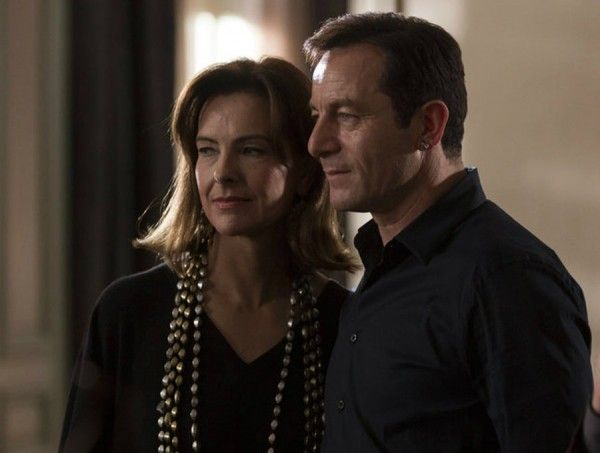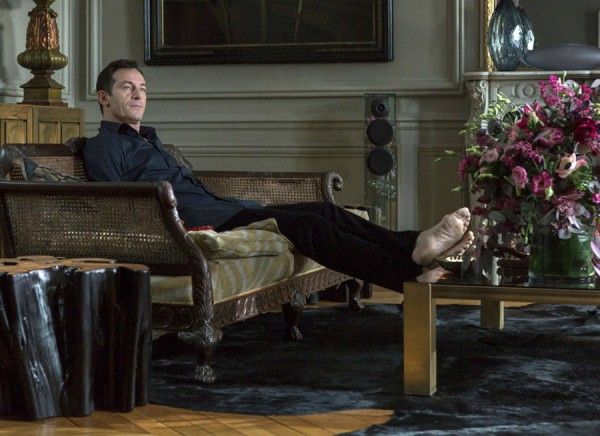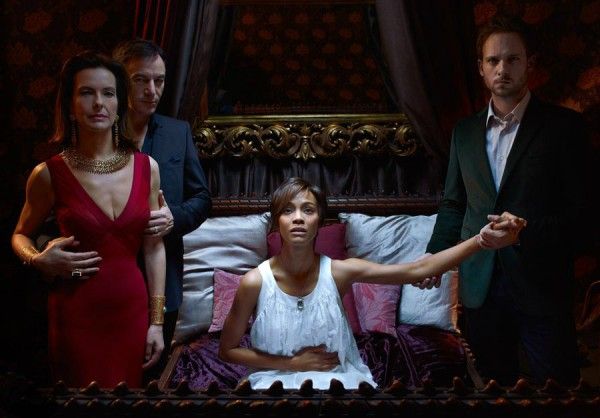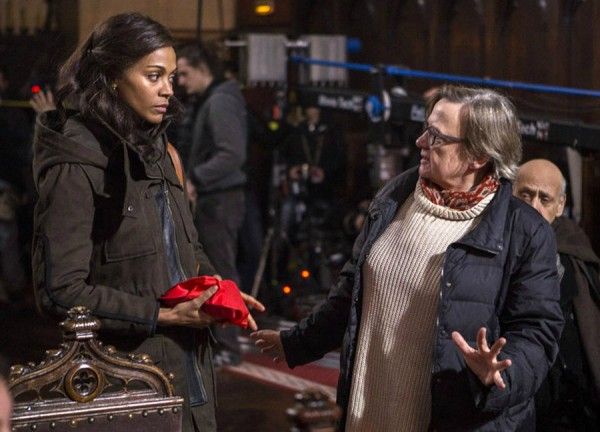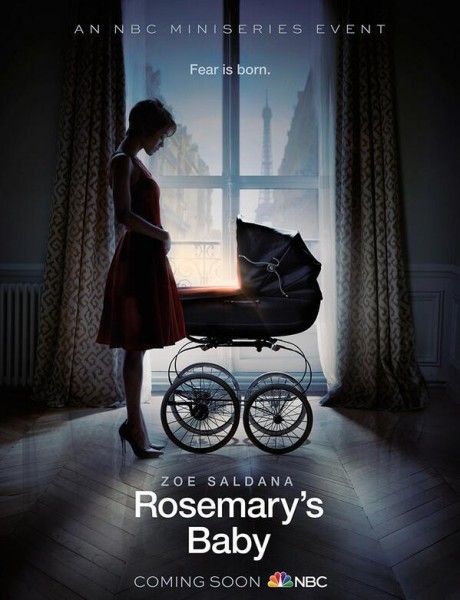Based on the 1967 best-selling suspense novel by Ira Levin, this new adaptation of Rosemary's Baby centers on a young married couple who escape New York and move to Paris with hopes of leaving their sad past behind. After a series of unfortunate events, Rosemary (Zoe Saldana) and Guy Woodhouse (Patrick J. Adams) are presented with an offer from Roman (Jason Isaacs) and Margaux Castevet (Carole Bouquet) that they can't refuse and that comes at an immeasurable price.
During this interview to promote the four-hour, two-part psychological thriller, actor Jason Isaacs talked about what makes this version different from the original, why this story still works, what it was like to work with director Agnieszka Holland, how class structure plays a role, how this version is more out-and-out horror, why people are so fascinated by evil, and how he feels about where American television is going. Check out what he had to say after the jump.
Question: What makes this version different from the original, and why do the basic themes still stand strong?
JASON ISAACS: There’s not that many great plots around us, and this is one of those fabulously scary, creepy things. Pregnancy is an enormous vulnerability. The ground feels shaky under your feet, and you really need to feel safe and that you can trust people. Zoe [Saldana] does an unbelievable job of being in a state of emotional distress, for the entire four hours. She doesn’t know who’s going to stay alive, who she can trust, whether she can trust her own husband, or whether she can trust this lovely, glamorous, chic couple that have basically adopted them and given them a lifestyle beyond their wildest imagination. At one point, she thinks she can’t trust anybody. But because this a modern story told in a rather brilliant, young, sentimental way by Agnieszka Holland. It’s so ludicrous to Rosemary, and so ridiculous and far-fetched, that whilst we’re at home, screaming at the television going, “Look behind you!,” she resists because who wouldn’t? Because it’s a primal fear that babies are so vulnerable, and people who are pregnant are so vulnerable, not knowing who to trust and being put in an environment where you know no one is scary.
I think it was a brilliant move to move the thing to Paris because they don’t speak the language around them, they don’t quite understand the culture around them, and they don’t even understand the medicine around them. There’s Margaux making these incredible herbal drinks for Rosemary. In France, on the public health system, you get homeopathy and naturopathy. So, they’re not quite sure. The ground is shaky beneath their feet, from the start. They’re in a tiny apartment, and then suddenly, they’re in a big, glamorous apartment. I was living there while we were shooting, in a place above a bakery that opened in 1366. There’s a sense of history. The roots are so deep and spread back so far that it feels somehow more believable. So, Rosemary’s Baby resonates because it’s creepy. This is a story that works. It worked once, as a great film in the ‘60s, and it worked once, as a phenomenal book in the ‘60s, and the writers reinvented it for today. Hopefully, it will work again.
What was it like to work with director Agnieszka Holland?
ISAACS: She’s a force of nature. She doesn’t take prisoners. There are five languages in which she can swear like Richard Nixon. I think she’s phenomenal. I would walk off of a cliff behind her. She’s made some of the most brilliant European films and mini-series. She is not interested in derivative acting, or any kind of emotional bullshit or sentimentality. She has seen and is continually curious about the worst aspects of human behavior and the corruption of the soul. She’s Eastern European and was glued, while we were shooting, to the news coming out of the Ukraine. She immediately went to Crimea to speak, when she wrapped this. She is a powerful, talented artist who is plugged into the real world, and she brings that to everything that she touches. So, I was a fan before, and I’m a bigger fan now.
Have you read the book?
ISAACS: I have read the book. The movie was made from a phenomenally successful and popular book. What the writers did, and all the best producers do, is look at the film and the book and cherry-picked the best of the narrative. And then, they set it somewhere completely different. It’s over a much longer period of time. They’ve changed the characters of Roman and Margaux entirely. And having Zoe at the center of this immediately makes it a piece of a different tone because she’s such a modern woman. There’s nothing weak about Zoe. And then, with Patrick [J. Adams] as her husband, he has such an open face and feels like such a charming, lovely, fine young man who is the kind of person that parents would happily have taking their daughter out to prom. The fact that he sold his wife out, it takes longer to come to terms with the terrible thing that he’s done and the terrible price that he’s paying. When you look at Patrick, your heart goes out to him, even though he’s, in some ways, the most despicable character on the screen. The characters are all so different. Hopefully, (author) Ira Levin and (director) [Roman] Polanski would enjoy it, and recognize the spirit of the story, but not the details.
This version of Rosemary’s Baby sees Rosemary as a modern woman. She’s not easily dominated or intimidated by her husband, but this wealthy chic couple seems to have a great deal of power over her. Was class something that was discussed? Did you see that as part of the character?
ISAACS: Yes, one of the things that attracted me to this is that it is so different from the original story. It seems to bear only the title and the bed in common. In the Polanski film, there is a rather harmless and sweet old couple. Roman represents that, and they tap into the worst elements and neurosis and egomania of all of us, which is that there are other people who are cooler, sexier, chicer, richer and, in every way, better than us. One of the great things about this is that, since Roman and Margaux have been around for a very long time, we’ve accumulated such wealth and power and clout in French society, and high society in general, that you can’t help be near us and be intimidated. And it’s one of the things we recognize, so we guide that weakness and that desire to be someone else. That made it so different from the original that I didn’t feel like there was any part of us that was recreating anything. It’s a human instinct that I think is in all of us.
In the original movie, they didn’t show too much of the baby. Is there more of the baby, this time out?
ISAACS: The great strength of any story, but particularly a creepy suspense/horror thriller is that you don’t know what’s coming next. I shouldn’t really tell you exactly what’s going on, but I can tell you that we have four hours of television. The Polanski movie was, in many ways, an exercise in paranoia.
You could finish the entire film and go, “Is she imagining this? Did any of this really happen?” Certainly, from Mia Farrow’s point of view, it did. But, that isn’t our story. Stuff is really happening on screen. And so, it’s a lot gorier, nastier, creepier and horrific. It’s more out-and-out horror, certainly for the second part. I’m not going to tell you how much you do or don’t see with the baby, but I will tell you that it’s not an exercise in paranoia that’s stretched to four hours. It’s more about that painful enjoyment that you have when you’re screaming at the heroine on screen and going, “When is she going to realize what we’ve realized and get out of that house?"
You’ve played evil characters before, but is there something specific that you tap into for that?
ISAACS: Well, it’s the same thing, whether you’re a wizard or you’re the guy who locked up a young girl in the basement for 20 years of her life, and now she’s in love with the guy who locked her up. You just try to find what’s real. Who are the people that would do these things? It’s a tougher gig to use your imagination. What would it be like if I’d been alive forever, and I was the devil’s child? For some odd reason, that didn’t seem like a big stretch to me. Most of the time, you try to create nuanced characters that are, like most of us, driven by a bubbling cauldron of fear, confidence, love, need, and all the rest of it. Every now and again, it’s nice to throw that all out the window and just lick your lips and be deliciously, confidently evil. And the nice thing about Roman is that everything is going his way. He has all the power in the world. And even if this doesn’t work out with Rosemary and Guy, they’re entirely expendable. There’s an infinite amount of time to do the devil’s work, so it’s nice, just for once, to take out that it’s not driven by fear and neurosis.
Do you have a preference between playing a villain or a hero?
ISAACS: I just like stuff that’s well written. The worst thing, as an actor, is to go somewhere because it’s well paid or the food’s good. I try and pick things to do that I think are fun and different, and will be fun to watch. The costumes, the settings, how big the thing is going to be and who’s going to watch it matter, but if you can’t do the job, it doesn’t matter. Within the confines of this story, I felt like there was a way to play Roman believably. The camera loves an inner life. It loves secrets. So, if you can’t have something going on behind your eyes, they’re only saying or doing things because the writers put them there. So, mostly my career choices are about trying to look as little like an idiot as possible. I respond to the best material that is in front of me. I never think of them as villains or heroes because out-and-out heroes are not only very boring, but almost impossible to play, as are out-and-out mustache-twirling villains. Unless you can believe them yourself, the audience will never believe you. You might as well stand up at a Renaissance Faire, not that there’s anything wrong with working a Renaissance Faire. I just would want to find something that I believe. Lucius Malfoy was a guy who was a racist, who felt left behind by the times, and whose boss utterly rejects and emasculates him, at every turn. So, I just try to find stuff that makes emotional sense to me and that might be interesting to watch.
How do you see Roman’s relationship with Guy?
ISAACS: Roman has done this before. Roman’s been around an awfully long time. He’s been around 100 guys. He recognizes the essential weakness in Guy’s soul. He sees where his ego is large enough to tap into it and to persuade him to make this awful sacrifice. And so, I certainly think that Guy would think Roman is his mentor. And then, of course, he becomes his captor. He’s a mouse and I’m the cat, or he’s a big game fish that I’m reeling in slowly. But once I have him, I have him. It doesn’t really matter what he thinks because I have him, forever.
How does Roman draw Guy in? What would make someone make the decision to turn their wife over to the devil?
ISAACS: I saw this documentary, a few years ago, about American and Russian athletes and steroids, and there were people who knew that they would probably shorten their life, in a terrible way, being ridden with cancer and disease, and they were asked, “If you could do it again, would you?” And these are people that had won gold medals, and they said that they absolutely would so it again. So, there’s this man who is told this his wildest dreams will come true, for both him and his wife, and that he’ll have untold wealth, fame and success, and that he could have more babies – all we’re asking is that he gives us a baby – it’s an easy thing to say yes to, from his point of view. She’s already in grief, having lost a baby, so she’ll lose another one. Miscarriages are extremely common. I think two in three pregnancies end in miscarriages. So, if you’ve already had a miscarriage, who’s to say that one more, to guarantee you the rest of your life in absolute luxury and with all of your dreams come true, isn’t worth it. Now, obviously, as the story plays out, I think Guy might well regret it, and certainly as the corpses pile up around him. And then, it becomes clear that he might have destroyed his marriage in the process. But at the moment, he makes the decision. This is a reward that seems worth it to Guy. That’s why we pick him. There’s a current of narcissism that runs deep in him, that’s deep enough that I can tap into it. But, it doesn’t seem that far-fetched to me. I’m not sure what I’d give up, if I knew that, for the rest of my life, I could provide for not only my family, but my extended family. Luckily, no one’s ever going to come to me with that offer.
Why do you think people are so fascinated with stories about the devil?
ISAACS: I don’t know. Why are people fascinated by evil? I think because we spend most of our life trying to do what we think of as the right thing and trying to be liked by people, or leaving an impression that is either good or better than we found them. We are continually fascinated by other people, or even creatures that don’t care and are trying to do harm or bad because it’s the antithesis of the human experience, and yet it’s somewhere it’s inside all of us. It beguiles to let all that go and be the very worst versions of ourselves. So, when we come across people who are, or the notion that there is a creature that is the very worst version you have of everything, it’s intriguing and terrifying.
Are you excited about the way that American television, both network and cable, has broadened itself and become really inviting to actors of all sorts?
ISAACS: I think it’s amazing. I think these are amazing times of making scripted drama. I don’t know if there’s enough eyeballs for all of the fabulous new outlets that are opening up. It’s making broadcast networks take much bigger risks and do short-form events, but it’s also making writers use their imaginations and dare to dream. I think it’s a golden time for commissioning and making things. There just aren’t enough viewers in the English-speaking world to sustain the scripted dramas in town. Actors just love telling stories. But how it will all shake out in the long run, I don’t know. There are so many new players. You can’t really expect viewers at home to subscribe to Amazon and Hulu and Netflix and HBO and Showtime, and the many other channels who will have to start charging.
I don’t know where it will go, but I do know that, as a creative person, I’m also trying to sell and produce things, and come up with ideas and take them around. There are so many rooms full of interesting, creative people who would like to help me make stuff that it doesn’t bear any resemblance to what it was like 10 years ago. And it’s great for the viewer. You need to get a big DVR. There’s just so many good things. The shame of it is that many of them will be canceled because, even if every single person in America sat down to watch TV every night, there aren’t enough viewers for as many good products as are coming onto our screens. There are talented people everywhere and they’re getting to tell stories which they just couldn’t tell some time ago.
Rosemary’s Baby airs on NBC in two parts, on May 11th and May 15th.


